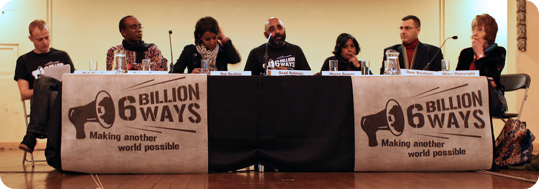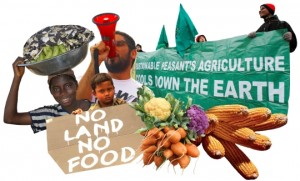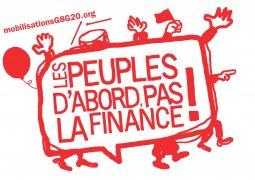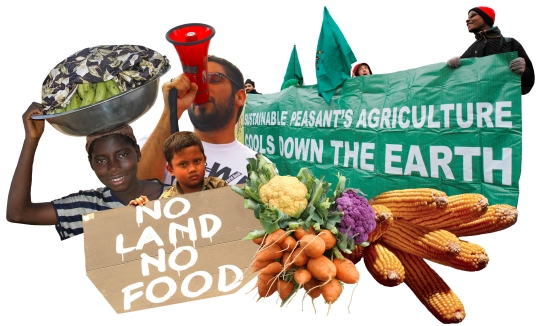
Saturday 5 March 2011. The day 6 Billion Ways returned with yet more debate, discussion, art, film and performance. Rich Mix and four neighbouring venues were flooded by 1,700activists from across the UK, temporarily transformed into hubs of global justice as the world’s leading thinkers and campaigners knocked heads for a common solution.
The East End has always been the home of progressive social movements, witnessing Keir Hardie and the first steps of a fledgling Labour Party, exiled Jews orchestrating resistance, the defeat of Britain’s fascists, South American revolutionaries taking shelter but never giving up the fight. It’s this spirit that 6 Billion Ways looked to and drew from in facing the multiple crises that are before us: repression of democracy, exploitation of our natural resources and atmosphere, a financial crisis that deepens by the day. The list could go on.
Session after session, film after film, not just problems but also solutions were given the space and time to be discussed and debated.
Egyptian activist Gigi Ibrahim brought firsthand experience of what it was like in Tahrir square, Cairo, during the uprising, sharing not only the hope of a better future but the determination that was held by everyone present.
Bolivian ambassador to the UN, Pablo Solon, spoke to 250 people about the need for social participation in the climate debate and the dangerous direction international negotiations are currently taking. At last year’s climate talks in Cancún, Solon was the only person to speak out against the resulting agreement, refusing to ratify a document that would – in the eyes of his government – lead to genocide and ecocide. Remarkably, this was all done via video conferencing and a 20 ft projection.
Practical discussions around fighting the cuts brought grass roots campaigners Michael Chessum (National Campaign Against Fees and Cuts), Jim Cranshaw (Oxford Save our Services) and Anna Walker (UK Uncut) together to talk tactics and alternatives.
Other sessions on consumption, the BDS (Boycott, Divestment, Sanctions) campaign against Israel, the food crisis and endless other subjects achieved similar aims of bringing the debate to the fore and examining solutions. But the real motivation driving the organisers of 6 Billion Ways forward – ultimately what made the event so relevant – was the need to connect these issues. Each is important in its own right, but when examined together, as symptoms of the same problem, it’s possible to see the bigger picture, to identify the drivers and to build a movement that can collectively direct its energy towards tackling them. The prevalence of corporations and their interests over those of citizens emerged from each session; the attitude of governments towards free trade and economic growth at all costs, no matter what the consequence; the ease with which accountability is ignored. Missing in each crisis is a notion of justice, be it social, economic, political or environmental, and it was in the name of justice – global justice – that 6 Billion Ways was convened.
The final rally captured perfectly the spirit that grew throughout the day and the pressing need for action, for movement building and for the fight on our hands as we demand justice. Omar Barghouti, founder of the BDS movement in Palestine, sent shivers down the spine as he delivered the memorable lines “I wish you Egypt so you can, like the Tunisians, the Egyptians, the Libyans, the Bahrainis, the Yemenis, and certainly the Palestinians, shout, “No! We do not want to select the least wrong answer. We want another choice altogether that is not on your damned list.” Given the choice between slavery and death, we unequivocally opt for freedom and dignified life–no slavery, and no death.”
But what is needed now – what has been recognised across the world – is how we build on what we have achieved, how we capture the energy so evident in that hall and channel it; where can it best be used and how can we make that happen? The TUC ‘March for an Alternative’ was a start, and one 6 Billion Ways united behind, but we need to keep building, relying on those that took part and those that support the common cause to keep fighting – not just in the name of our individual interests and causes but for global justice and a, as Omar put so well, “It is time for all the people of this world, particularly the most exploited and downtrodden, to reassert our common humanity and reclaim control over our common destiny.”












